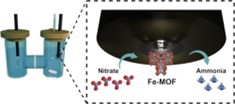Seminar on 3D printing for electrochemical energy conversion: from hydrogen generation to ammonia production

Prof Martin Pumera Head of Future Energy & Innovation Lab Central European Institute of Technology, Brno University of Technology, Czech Republic This seminar will be chaired by Asst Prof Lum Guo Zhan. |
| Seminar Abstract |
The advent of 3D printing technology has revolutionized numerous fields, including the realm of electrochemical energy conversion. This talk delves into the innovative applications of 3D printing in enhancing the efficiency and scalability of electrochemical processes, particularly focusing on hydrogen generation and ammonia production. By leveraging the precision and customization capabilities of 3D printing, we explore the fabrication of advanced electrode materials and reactor designs that optimize catalytic performance and energy utilization. The discussion will cover the synthesis of 3D-printed electrodes, their electrochemical properties, and the integration of these components into functional systems for sustainable hydrogen and ammonia production. Furthermore, we will highlight case studies and experimental results that demonstrate the potential of 3D printing to address current challenges in renewable energy storage and chemical manufacturing. This presentation aims to provide a comprehensive overview of the intersection between 3D printing technology and electrochemical energy conversion, offering insights into future directions and opportunities for research and industrial application. References Pumera et alpplied Catalysis B: Environmental 330, 122632 Pumera et al., ACS Appl. Mater. Interfaces 2023, 15, 40, 47294–47306
|
| Speaker's Biography |
Distinguished Professor Martin Pumera is a Head of Future Energy & Innovation Lab at CEITEC, Brno, Czech Republic and Director of Advanced Nanorobots Laboratory at Technical University Ostrava. He received his Ph.D. at Charles University, Czech Republic, in 2001. After two postdoctoral stays (in the United States and Spain), he became a tenured group leader at the National Institute for Materials Science, Japan, in 2006. In 2010 Martin joined Nanyang Technological University, Singapore, where he worked as a tenured professor for almost a decade. Prof. Pumera has broad interests in nanomaterials and microsystems, in the specific areas of electrochemistry and synthetic chemistry of 2D nanomaterials, nanotoxicity, micro and nanomachines, and 3D printing. Martin is “2017, 2018, 2019, 2020 and 2021 Highly Cited Researcher” by Clarivate Analytics. He published over 900 papers which received more than 75,000 citations. Martin's h-index is 128. Martin has supervised over 100 postdoctoral associates, 30 PhD students. Martin takes pride that 25 group members became faculty members at the Universities around the World, from Spain to Singapore. Total funding Martin received as PI is over 33 M EURO. Prof. Pumera is Editor-in-Chief of Appl. Mater. Today (IF 8.6) and member of Editorial Boards of ACS Nano, Small, Chem Eur J, Electrochem Commun, ChemElectroChem, Electroanalysis and other journals. |


